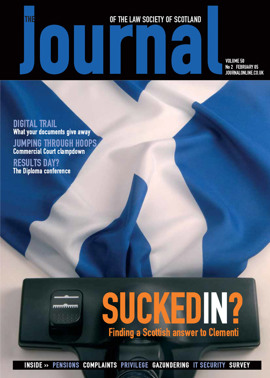Is "gazundering" always bad?
This is particularly relevant to Edinburgh where offers subject to survey are now the norm. Does this apply to closing date situations only, or to both closing date situations and situations where an offer has been made without a closing date, such as for a fixed price property? Surely (and particularly in the latter situation) it is not in the interest of the seller that a renegotiation of the price cannot be suggested without the purchaser having to resort to another solicitor. At the end of the day the seller can surely say “no” to such a suggested renegotiation on the price if they are not interested at a lower price, but not even being offered the option to renegotiate due to the guidelines would not be in the interest of the seller. Obviously some purchasers may resort to going to another solicitor to renegotiate the offer, but some will choose not to do so given their otherwise excellent relationship with their current solicitor or due to the inconvenience, or both. I can only see that it will create situations where the usual negotiating process has to be knocked on the head and existing clients of the firm have to be turned away to other solicitors for no good reason.
I can see some more relevance of this in a closing date situation, but in any event, if the seller is happy to renegotiate with the original offeror and decides to accept a lower offer, I can see no harm in this. At the end of the day, the seller could decide to revert to the second highest offeror if that were preferable.
A second point is that the sellers are not usually party to what the client’s survey says and I assume that there is no obligation on the solicitor acting for the purchaser to disclose any problem raised in the survey report. Who is to know if the problem relates to a low valuation or indeed to a rot problem? Would it be sufficient to say that the surveyor mentioned that there were a few slates missing from the roof before negotiating a £15,000 reduction in the purchase price?
Surely we should be trying to lay down guidelines that will be reasonable and will look after interests of the purchasers, the sellers and, to a certain extent, the solicitors. I would have thought that “gazundering” should only be a term that would be used in a situation where an offer had been accepted and any “subject to survey” clause had been removed by the purchasing solicitor without any qualifications regarding that survey. I can see that it is unfair to “gazunder” once that stage has been reached, but I really cannot agree with the suggestion that the price cannot be negotiated once a survey report has been received by the purchaser and before the “subject to survey” clause has been uplifted/deleted.
I think it is important that the guidelines are clarified by the Conveyancing Committee as to what we need to do in this particular circumstance.
I think it is patently unfair that we have to refuse to act for and also inconvenience perfectly good clients if, as sometimes happens, survey valuations do not meet the purchaser’s needs or expectations. I hope that this is not a suggestion to detract from the current practice in Edinburgh of offering “subject to survey” and to railroad us towards the seller’s survey.
Struan Douglas, Purdie & Co, Edinburgh
In this issue
- Sell or transfer? (1)
- Promoting competition or competitiveness?
- Promoting competitiveness or competition?
- Not the final word
- Challenge of the FSA
- The pull of the south
- A world of change
- Finding the path
- An elusive model?
- Bank on it
- Trouble at t'mill
- Hidden evidence
- Money claims on behalf of children
- Secure connections
- Tread carefully
- Sell or transfer?
- Cracking the conflict code
- X Factor for success?
- Scottish Solicitors' Discipline Tribunal
- Website reviews
- Book reviews
- Is "gazundering" always bad?
- Defining the guideline






